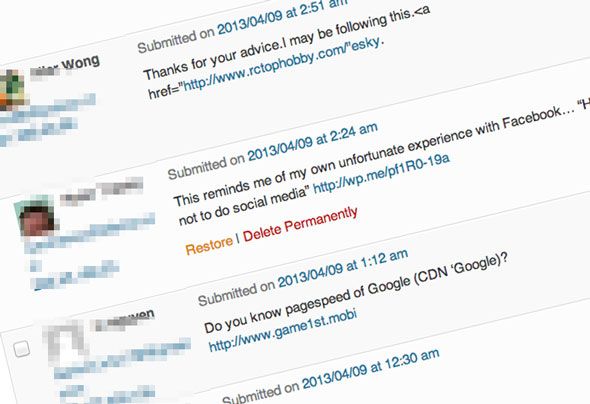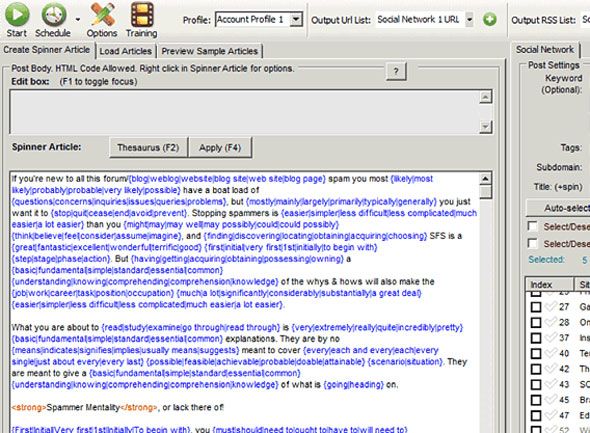For most people, SEO consists of making sure your page content is compelling and the metadata accurately describes the page without keyword stuffing. But there's another side to SEO - the world of blackhats. The dark enclave of the blackhat SEO is a fascinating place, and I took some time to talk to a friend who was involved in the blackhat SEO business for some time - here's what we discussed. I know you can't exactly MakeUseOf this, but I hope it's interesting nonetheless.
I should note, I've been waiting to publish this for a few years, for reasons of protecting their identity and ensuring the tools or practices are no longer relevant. Most of what is mentioned no longer works. In fact, it'll get your site de-ranked faster than you can say Google if you touch any of them, which is precisely what happened to this particular network he was involved with.
The sites being discussed are commonly known as "adsense farms", specifically designed to make Adsense profit and not much else. Nevertheless, I've censored the names of the tools just in case. Play safe in your SEO journey!
Can You Give Me An Outline Of Your Blackhat SEO Job?
I create sites, load them up with pre-written content and lots of adsense blocks, make it all look pretty, then promote the heck out of them using some different tactics, like link spamming, hidden links etc.
What Was The Motivation?
It's just a job for me, and I'm good at what I do. Not I'm the one who profits from any of the sites I promote of course - I'm just a salaried lackey. I'm not privy to exact figures, but I'm under the impression that the best performing sites make about $50/day in Adsense profits. There are a few hundred or so sites in the network (that I know about, at least), covering a big range of niche topics - anything that has a high Adsense payout is a potential target.
Doesn't matter what, but certain topics are just more profitable than others - so they pay more per ad click - things like pet insurance, plastic surgery and such. That's how profits can be fairly high even without crazy traffic levels. I keep promising myself I'll identify one of these niches some day and start building my own network, but it never happens.
Can You Describe a Typical Workday?
First off, I'd check on the status of the comment spam campaigns...
Comment Spam? That's The Kind Of Nonsense Comments With a Link You Commonly Get On Blogs?
Yes, exactly. You start by scraping Google for a few hundred thousand links - from related keywords etc. You can then analyze each link for site PR - and manually target the high PR sites if you want. The automated comment engine would hit the rest, using what's called "spin text" - an automatic way of changing words to prevent comments being exactly the same. The typical comment spam you get on blogs is just so amateur - a shotgun approach that uses an automated dictionary or no spin at all - and is completely ineffective.
Crafting your own effective spin text is an art form - one thing I've found really works is to add an emotional story to it, like talking about how "my grandmother used to do X and this post reminded me of that, thank you so much for the memories". Making the comments sound natural is the key, really. Sure, they won't always be relevant, but it doesn't really matter if you've sent it out to 100,000 blogs. Say you get 100 links - that's pretty good.
What About Blogs That Use a "Captcha" Service To Prevent Spamming?
Most of those systems are worthless. The tools I use integrate with APIs from anti-captcha services, so anything that's protected like that gets sent over to a human captcha solver for less than 1 cent each time. If anything, the blogs with captchas are easier, since they usually don't bother with other spam protection. I guess they assume that if a human wrote it then it must be legit. There is NO reliable defence against spam honestly. Some bloggers are just so desperate and naive they'll approve anything.
I also check some SEO forums for information on the latest high profile blogs that are open for do-follow links - I target these manually because they're worth so much. Occasionally you strike gold and find an .edu or .gov blog just wide open for the taking.
Is It All About Spamming?
No - but I won't lie, that was a big part of it. As well as comment spamming software that I ran on my spare computer, we would use third party services like XR**** that specialize in forum spam - they cost about $50 for 50,000 links of dubious quality. Still - a link is a link.
More recently, I've been playing with SE***** - it's a complex bit of software that aims to automate a lot of these workflows - and handles creation of thousands of fake social accounts at a time, submitting links from those accounts to various bookmarking services, as well as spin text article submission. It's incredible, and you can even load in user-created workflows - the pyramid design is quite popular at the moment, with a first tier of articles pointing to a single money site, then a second tier of articles and press releases pointing to those, and finally social bookmarking links pointing toward those 2nd tier elements. It's all about making the links look natural, and I'm pretty sure this software is going to change the industry forever.
Can Google Detect "Fake" Links?
Of course - and if they think the links might not be natural, you'll be put into the "sandbox", where the site is worthless for about 6 months, until it magically re-appears ranking high in the SERPS.
So, The Articles On The Sites, Who Writes Them?
The content costs anywhere from $3-$5 per 400 word article, and sometimes I write them myself if they need extra special care. We usually put at least 50 posts on something before promoting it. Mostly they're written by outsourced labor from India, and the Philippines. But remember that the user isn't really supposed to read it, they're just supposed to hit the site, then click on one of the more interesting Adsense banners or link blocks.
So we don't really care if they stick around and read anything - that's not the point. For most webmasters, a high bounce rate [percentage of users who immediately click a link to somewhere external] is a bad thing - for us, it means users are clicking on ads, which is good.
Do You Feel Any Remorse For What You Do?
Not really, it's just a job. I find holes in systems and exploit them - but the sites I promote aren't dangerous or hurting anyone - it's not like we just publish lies. In fact, a lot of what I do is taking an existing site with really low quality content, and improving both the design and content of it to relaunch - sites that were once doing well, but have since dropped.
Thanks For Your Time, Anon.
I hope you found this interview with a blackhat SEO expert interesting. But remember - anything like this WILL get your site banned if you try it today. Google has made huge advances in the past few years, and retroactively fixing sites that have had this kind of blackhat work done on them is virtually impossible. If you are interested in SEO though, we have a lot of helpful SEO articles here at MakeUseOf by our own resident SEO expert Ryan Dube.
For more up to date information on making your blog or website pay, check out my own extensive Guide to Website Monetization.
Image Credit: Shutterstock - hacker



